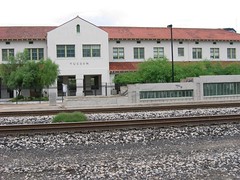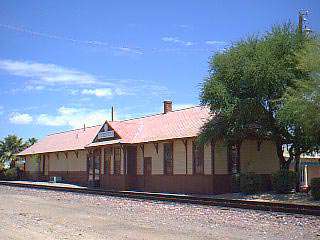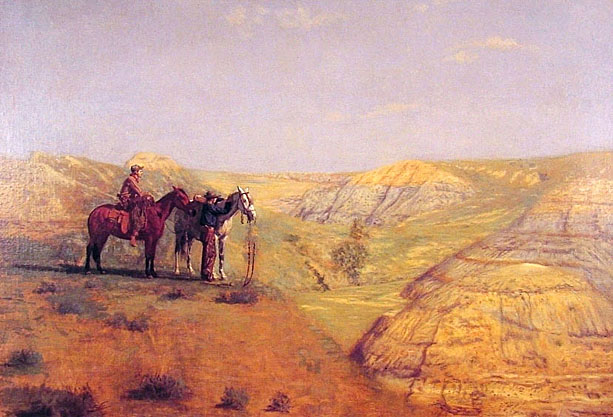
At last all was ready, and the day was fixed for the departure of the troops.
The winter rains had set in, and the skies were grey, as the command marched down to the boat.
 the models by bmc are easily convertible into arizona cavalry of the period.This one hasnt got a great paint job as its too shining, try for a matt of eggshell finish.
the models by bmc are easily convertible into arizona cavalry of the period.This one hasnt got a great paint job as its too shining, try for a matt of eggshell finish.The officers and soldiers were in their campaign clothes; the latter had their blanket-rolls and haversacks slung over their shoulders, and their tin cups, which hung from the haversacks rattled and jingled as they marched down in even columns of four, over the wet and grassy slopes of the parade ground, where so short a time before all had been glitter and sunshine.
The officers' wives and the soldiers' wives followed the troops to the dock. The soldiers marched single file over the gang-plank of the boat, the officers said good-bye, the shrill whistle of the “General McPherson” sounded—and they were off. We leaned back against the coal-sheds, and soldiers' and officers' wives alike all wept together.

And now a season of gloom came upon us. The skies were dull and murky and the rain poured down.
Our old friend Bailey, who was left behind on account of illness, grew worse and finally his case was pronounced hopeless. His death added to the deep gloom and sadness which (below trooper named powers)enveloped us all.

A few of the soldiers who had staid on the Island to take care of the post, carried poor Bailey to the boat, his casket wrapped in the flag and followed by alittle procession of women. I thought I had never seen anything so sad .fort halleck

The campaign lengthened out into months, but the California winters are never very long, and before the troops came back the hills looked their brightest green again. halleck today

Fort Halleck was only thirteen miles south of the Overland Railroad, and lay near a spur of the Humboldt range. There were miles of sage-brush between the railroad and the post, but the mountains which rose abruptly five thousand feet on the far side, made a magnificent background for the officers' quarters, which lay nestled at the bottom of the foot-hills.
‘‘“Oh! what a lovely post!”’’ I cried, as we drove in.

Major Sanford of the First Cavalry, with Captain Carr and Lieutenant Oscar Brown, received us. “Dear me,” I thought, “if the First Cavalry is made up of such gallant men as these, the old Eighth Infantry will have to look out for its laurels.”
Mrs. Sanford and Mrs. Carr gave us a great welcome and vied with each other in providing for our comfort, and we were soon established.
It was so good to see the gay yellow of the cavalry again! Now I rode, to my heart's content, and it was good to be alive; to see the cavalry drill, and to ride through the cañons, gorgeous in their flaming autumn below early us cavalry 1845

tints; then again to gallop through the sage-brush, jumping where we could not turn, starting up rabbits by the score.

That little old post, now long since abandoned, marked a pleasant epoch in our life. From the ranches scattered around we could procure butter and squabs and young vegetables, and the soldiers cultivated great garden patches, and our small dinners and breakfasts live in delightful memory.

At the end of two years spent so pleasantly with the people of the First Cavalry, our company was again ordered to Angel Island. But a second very active campaign in Arizona and Mexico, against Geronimo, took our soldiers away from us, and we passed through a period of considerable anxiety. June of '86 saw the entire regiment ordered to take station in Arizona once more.below benicia station today

We travelled to Tucson in a Pullman car. It was hot and uninteresting. I had been at Tucson before, but the place seemed unfamiliar. I looked for the old tavern; I saw only the railroad restaurant. We went in to take breakfast, before driving out to the post of Fort Lowell, seven miles away. Everything seemed changed. Iced cantaloupe was served by a spick-span alert waiter; then, quail on toast. “Ice in Arizona?” It was like a dream, and I remarked to Jack, “This isn't the same Arizona we knew in '74,” and then, “I don't believe I like it as well, either; all this luxury doesn't seem to belong to the place.” Tuc son station below

After a drive behind some smart mules, over a flat stretch of seven miles, we arrived at Fort Lowell, a rather attractive post, with a long line of officers' quarters, before which ran a level road shaded by beautiful great trees.
 We were assigned a hall of one of these sets of quarters, and as our hall had no conveniences for house-keeping, it was arranged that we should join a mess with General and Mrs. Kautz and their family.above early mid vicxtorian us cavalry riveresco below andrea
We were assigned a hall of one of these sets of quarters, and as our hall had no conveniences for house-keeping, it was arranged that we should join a mess with General and Mrs. Kautz and their family.above early mid vicxtorian us cavalry riveresco below andrea We soon got settled down to our life-there, and we had various recreations; among them, driving over to Tucson and riding on horseback are those which I remember best. We made a few acquaintances in Tucson, and they sometimes drove out in the evenings, or more frequently rode out on horseback.britains dakota easily convertible to apache
We soon got settled down to our life-there, and we had various recreations; among them, driving over to Tucson and riding on horseback are those which I remember best. We made a few acquaintances in Tucson, and they sometimes drove out in the evenings, or more frequently rode out on horseback.britains dakota easily convertible to apache Then we would gather together on the Kautz piazza and everybody sang to the accompaniment of Mrs. Kautz's guitar. It was very hot, of course; we had all expected that, but the luxuries obtainable through the coming of the railroad, such as ice, and various summer drinks, and lemons, and butter, helped out to make the summer there more comfortable. an arizona station
Then we would gather together on the Kautz piazza and everybody sang to the accompaniment of Mrs. Kautz's guitar. It was very hot, of course; we had all expected that, but the luxuries obtainable through the coming of the railroad, such as ice, and various summer drinks, and lemons, and butter, helped out to make the summer there more comfortable. an arizona station
We slept on the piazzas, which ran around the houses, on a level with the ground. At that time the fad for sleeping out of doors, at least amongst civilized people, did not exist, and our arrangements were entirely primitive.

Our quarters were surrounded by a small yard and a fence; the latter was dilapidated, and the gate above marx pioneers

swung on one hinge. We were seven miles from anywhere, and surrounded by a desolate country. I did not experience the feeling of terror that I had had at Camp Apache, for instance, nor the grewsome fear of the Ehrenberg grave-yard, nor the appalling fright I had known in crossing the Mogollon range of in driving through Sanford's Pass.
But still there was a haunting feeling of insecurity which hung around me, especially at night. I was awfully afraid of snakes, and no sooner had we lain ourselves down on our cots to sleep, than I would hear a rustling among the dry leaves that had blown in under our beds.

Then all would be still again; then a crackling and a rustling—in a flash I would be sitting up in bed. ‘‘“Jack, do you hear that?”’’ Of course I did not dare to move or jump out of bed, so I would sit, rigid, scared. ‘‘“Jack! what is it?”’’ ‘‘“Nonsense, Mattie, go to sleep; it's the toads jumping about in the leaves.”’’ But my sleep was fitful and disturbed, and I never knew what a good night's rest was.Apache County below

One night I was awakened by a tremendous snort right over my face. I opened my eyes and looked into the wild eyes of a big black bull. I think I must have screamed, for the bull ran clattering off the piazza and out through the gate. By this time Jack was up, and Harry and Katharine, who slept on the front piazza, came running out, and I said: ‘‘“Well, this is the limit of all things, and if that gate isn't mended to-morrow, I will know the reason why.”’’

Now I had heard a vague rumor that there was a creature of this sort in of near the post, and that he had a habit of wandering around at night, but as I had never seen him, it had made no great impression on my mind. Jack had a great laugh at me, but I did not think then, nor do I now, that it was anything to be laughed at.
We had heard much of the old Mission of San Xavier del Bac, away the other side of Tucson.
 Mrs. Kautz decided to go over there and go into camp and paint a picture of San Xavier. It was about sixteen miles from Fort Lowell.
Mrs. Kautz decided to go over there and go into camp and paint a picture of San Xavier. It was about sixteen miles from Fort Lowell.
So all the camp paraphernalia was gotten ready and several of the officers joined the party, and we all went over to San Xavier and camped for a few days under the shadow of those beautiful old walls.
This Mission is almost unknown to the American traveller.
Exquisite in color, form and architecture, it stands there a silent reminder of the Past.
The curious carvings and paintings inside the church, and the precious old vestments which were shown us by an ancient custodian, filled my mind with wonder. The building is partly in ruins, and the little squirrels were running about the galleries, but the great dome is intact, and many of the wonderful figures which ornament it. Of course we know the Spanish built it about the middle of last of the sixteenth century, and that they tried to christianize the tribes of Indians who lived around in the vicinity
No comments:
Post a Comment